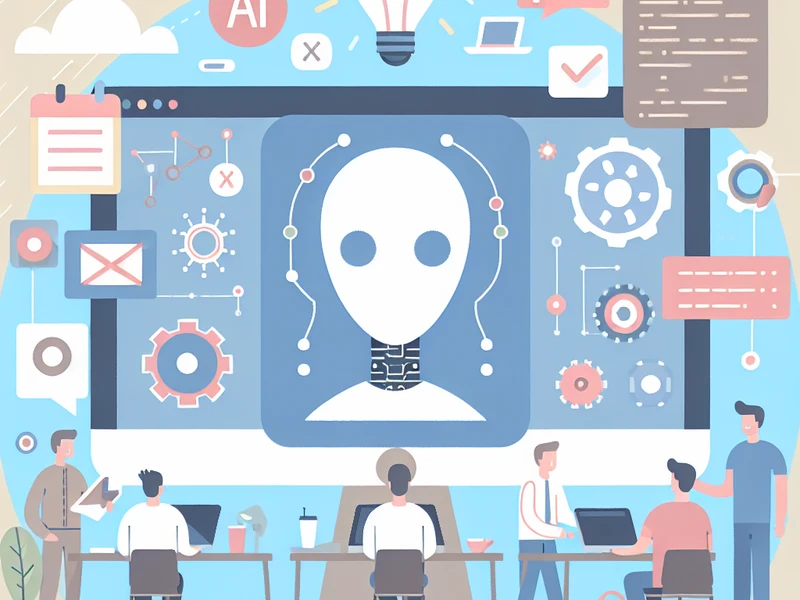From Snippets to Agents: The Evolution of AI in Software Development (2023–2026)
The adoption of Artificial Intelligence in software development has experienced an accelerated progression over the last three years. From simple code suggestions to true autonomous agents, AI tools are changing the way teams design, write, test, and release software.
In this article, we will analyze the three fundamental steps of this evolution: the beginnings (2023), the paradigm shift (2024), the present of autonomous agents (2025), and the future prospects (2026).
It seems that the text you intended to provide for translation is missing. Please provide the text you’d like me to translate, and I’ll be happy to assist you!
2023: the era of “prompt-to-snippet”
In 2023, AI in development was still in its early stages. The main tools were:
- GitHub Copilot, released in GA in June 2022.
- ChatGPT-3.5, launched in November 2022.
These tools operated with a “prompt-to-snippet” approach: the developer would write a prompt in natural language and receive code suggestions, useful but with limited context.
Technical Limitations of 2023
- Models like Codex and GPT-3.5 had reduced context windows (up to 4k tokens).
- Limited ability to analyze complex repositories.
- Output often syntactically correct but semantically fragile.
The result was an interesting support, but far from being reliable for complete development pipelines.
It seems that the text you intended to provide for translation is missing. Please provide the text you would like translated, and I’ll be happy to assist you!
2024: the paradigm shift
In 2024, the transition to a new generation of models and tools was marked.
More Powerful Models
- GPT-4 (OpenAI), released in March 2023, with extended contexts.
- Claude Sonnet (Anthropic), with later versions focused on long interactions.
- LLaMA 3.1 (Meta) and Gemma 2/3 (Google), increasingly adopted in open source contexts.
New Tools for Developers
- Cursor and Replit Ghostwriter have brought AI into the IDE.
- Prompt engineering has become a standalone skill.
- The initial approaches of RAG for code have improved reliability by reducing hallucinations.
The paradigm has shifted from AI that completes fragments to AI that participates in the development cycle, with contexts of up to tens of thousands of tokens.
It seems that there is no text provided for translation. Please provide the text you would like to have translated, and I will be happy to assist you!
2025: the era of autonomous agents
Today, in 2025, the focus has shifted to agentic AI agents, capable of performing autonomous tasks and orchestrating development flows.
Cutting-Edge Models
- Claude Opus 4 and Claude Sonnet 4 (Anthropic): among the most performant on long tasks and complex coding.
- GPT-4.1 (OpenAI): natively integrated into enterprise platforms.
- Gemini 2.5 Pro (Google DeepMind): strong in multimodal reasoning.
- Llama 4 (Meta), in the Scout and Maverick variants, with contexts of up to nearly 1M tokens.
What changes in practice
- Automatic debugging: agents that detect errors and propose fixes.
- Intelligent deployment: CI/CD pipelines orchestrated by AI.
- Autonomous code review: structured and explainable suggestions.
- Repository-level analysis: understanding entire codebases, not just snippets.
The paradigm shifts from “passive assistant” to “virtual colleague” that collaborates in development, with autonomous decision-making capabilities but under human supervision.
It seems that the text you intended to provide for translation is missing. Please provide the text you’d like me to translate, and I’ll be happy to assist you!
2026: future scenarios
Looking ahead, in 2026 we expect further maturation, with multi-level agents and hybrid models.
Multi-role Agents
The agents will work in virtual teams, with distinct roles:
- Planner: defines the strategy and tasks.
- Coder: writes the code.
- Tester: performs unit and integration tests.
- Auditor: verifies compliance, security, and compliance.
Hybrid Models
New models will combine neural networks and symbolic engines to provide more verifiable and explainable reasoning.
Intelligent DevOps
- Pipelines that anticipate regressions based on advanced telemetry.
- Codebase with auto-documentation and auto-refactoring.
- “AI-first” governance with audit trail, explainability, and model versioning.
In this scenario, the developer will no longer be just a “line of code author,” but an architect of intelligent systems, responsible for context, ethics, and AI strategy.
It seems that the text you wanted to translate is missing. Could you please provide the text you would like to have translated?
Implications for Businesses and Developers
- For developers: required skills evolve from pure coding to AI system design and writing effective prompts.
- For companies: it is necessary to introduce AI-first governance, with policies, audits, and monitoring tools.
- For the market: those who adopt these paradigms earlier can gain a competitive advantage in time-to-market, resilience, and innovation.
It seems that the text you want to translate is missing. Please provide the text you would like me to translate to English, and I’ll be happy to assist!
Conclusion
From 2023 to 2026, we are witnessing a true revolution: from tools that suggested snippets to ecosystems of autonomous agents integrated into the development cycle.
AI does not replace the developer but transforms their role: from simple coder to context strategist and quality guarantor.
Those who can timely grasp this change will lead innovation, while those who remain anchored to old tools risk being left out.
It seems that the text you intended to provide for translation is missing. Please provide the text you’d like translated, and I’ll be happy to assist you!
➡️ Do you want to understand how to integrate AI and agents into your company’s development cycle? Contact me for targeted consulting.


